现在分词作状语的分类(伴随、让步、条件、时间等等)
- 格式:docx
- 大小:31.83 KB
- 文档页数:7


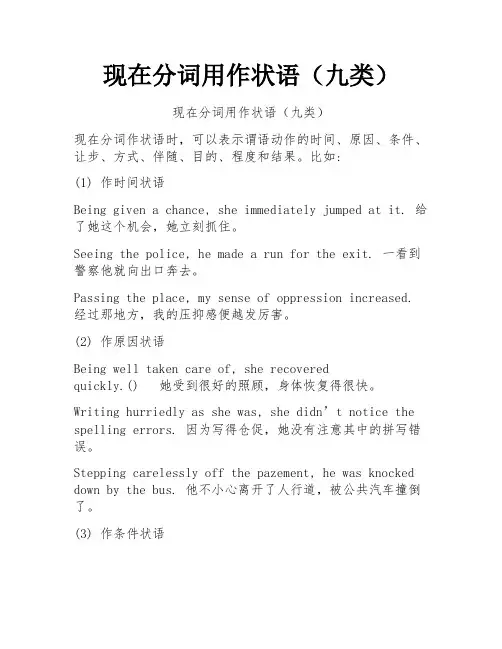
现在分词用作状语(九类)现在分词用作状语(九类)现在分词作状语时,可以表示谓语动作的时间、原因、条件、让步、方式、伴随、目的、程度和结果。
比如:(1) 作时间状语Being given a chance, she immediately jumped at it. 给了她这个机会,她立刻抓住。
Seeing the police, he made a run for the exit. 一看到警察他就向出口奔去。
Passing the place, my sense of oppression increased. 经过那地方,我的压抑感便越发厉害。
(2) 作原因状语Being well taken care of, she recoveredquickly.() 她受到很好的照顾,身体恢复得很快。
Writing hurriedly as she was, she didn’t notice the spelling errors. 因为写得仓促,她没有注意其中的拼写错误。
Stepping carelessly off the pazement, he was knocked down by the bus. 他不小心离开了人行道,被公共汽车撞倒了。
(3) 作条件状语Being advised to talk less, Mary keeps silent while we talk. 要是叫她少说点,当我们说话的时候,玛丽就会保持沉默。
It will take you half an hour to get to the station, allowing for traffic delays. 把路上的耽搁算进去,你要用半小时才能到车站。
Being defeated in every battle, the enemy will soon surrender. 要是敌人每场战斗都被打败,那他们就会投降。
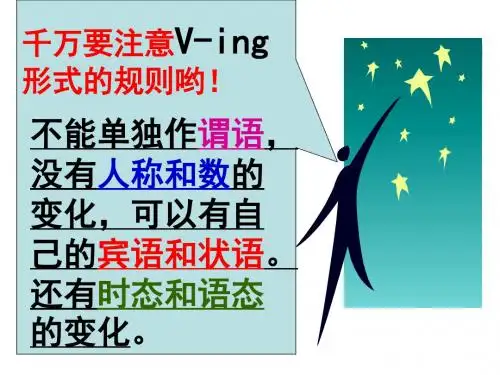
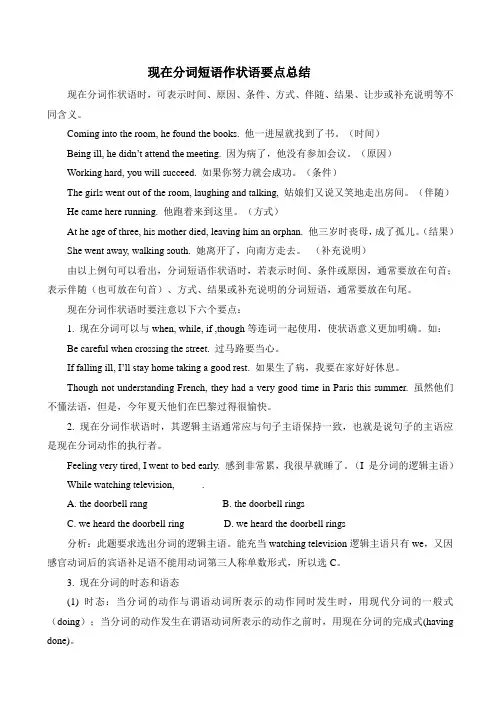
现在分词短语作状语要点总结现在分词作状语时,可表示时间、原因、条件、方式、伴随、结果、让步或补充说明等不同含义。
Coming into the room, he found the books. 他一进屋就找到了书。
(时间)Being ill, he didn’t attend the meeting. 因为病了,他没有参加会议。
(原因)Working hard, you will succeed. 如果你努力就会成功。
(条件)The girls went out of the room, laughing and talking, 姑娘们又说又笑地走出房间。
(伴随)He came here running. 他跑着来到这里。
(方式)At he age of three, his mother died, leaving him an orphan. 他三岁时丧母,成了孤儿。
(结果)She went away, walking south. 她离开了,向南方走去。
(补充说明)由以上例句可以看出,分词短语作状语时,若表示时间、条件或原因,通常要放在句首;表示伴随(也可放在句首)、方式、结果或补充说明的分词短语,通常要放在句尾。
现在分词作状语时要注意以下六个要点:1. 现在分词可以与when, while, if ,though等连词一起使用,使状语意义更加明确。
如:Be careful when crossing the street. 过马路要当心。
If falling ill, I’ll stay home taking a good rest. 如果生了病,我要在家好好休息。
Though not understanding French, they had a very good time in Paris this summer. 虽然他们不懂法语,但是,今年夏天他们在巴黎过得很愉快。
2. 现在分词作状语时,其逻辑主语通常应与句子主语保持一致,也就是说句子的主语应是现在分词动作的执行者。
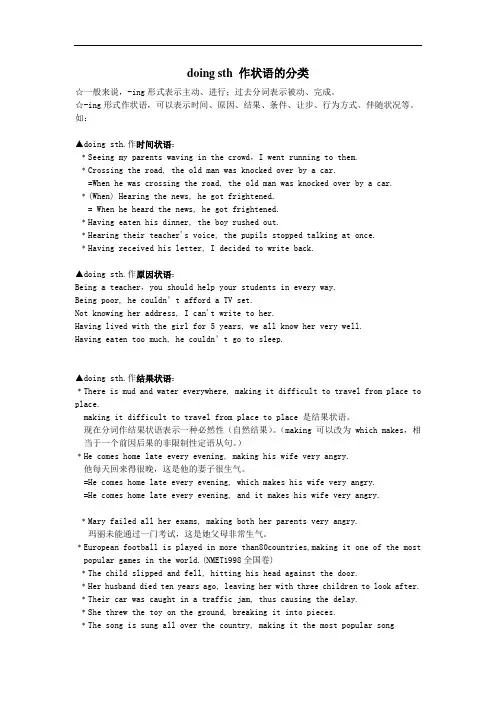
doing sth 作状语的分类☆一般来说,-ing形式表示主动、进行;过去分词表示被动、完成。
☆-ing形式作状语,可以表示时间、原因、结果、条件、让步、行为方式、伴随状况等。
如:▲doing sth.作时间状语:﹡Seeing my parents waving in the crowd,I went running to them.﹡Crossing the road, the old man was knocked over by a car.=When he was crossing the road, the old man was knocked over by a car.﹡(When) Hearing the news, he got frightened.= When he heard the news, he got frightened.﹡Having eaten his dinner, the boy rushed out.﹡Hearing their teacher's voice, the pupils stopped talking at once.﹡Having received his letter, I decided to write back.▲doing sth.作原因状语:Being a teacher,you should help your students in every way.Being poor, he couldn’t afford a TV set.Not knowing her address, I can't write to her.Having lived with the girl for 5 years, we all know her very well.Having eaten too much, he couldn’t go to sleep.▲doing sth.作结果状语:﹡There is mud and water everywhere, making it difficult to travel from place to place.making it difficult to travel from place to place 是结果状语。
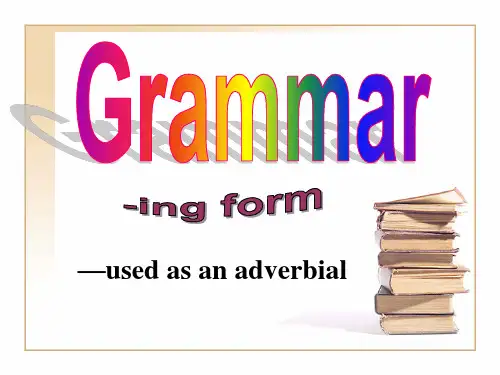
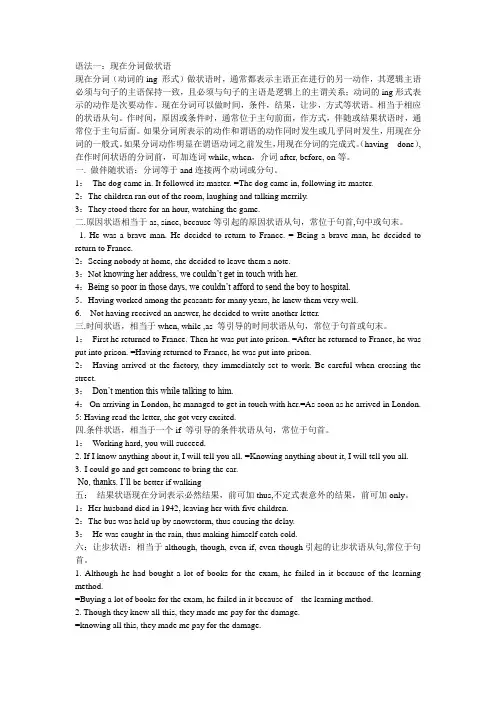
语法一:现在分词做状语现在分词(动词的ing 形式)做状语时,通常都表示主语正在进行的另一动作,其逻辑主语必须与句子的主语保持一致,且必须与句子的主语是逻辑上的主谓关系;动词的ing形式表示的动作是次要动作。
现在分词可以做时间,条件,结果,让步,方式等状语。
相当于相应的状语从句。
作时间,原因或条件时,通常位于主句前面,作方式,伴随或结果状语时,通常位于主句后面。
如果分词所表示的动作和谓语的动作同时发生或几乎同时发生,用现在分词的一般式。
如果分词动作明显在谓语动词之前发生,用现在分词的完成式。
(having done),在作时间状语的分词前,可加连词while, when,介词after, before, on等。
一. 做伴随状语:分词等于and连接两个动词或分句。
1:The dog came in. It followed its master. =The dog came in, following its master.2:The children ran out of the room, laughing and talking merrily.3:They stood there for an hour, watching the game.二.原因状语相当于as, since, because等引起的原因状语从句,常位于句首,句中或句末。
1. He was a brave man. He decided to return to France. = Being a brave man, he decided to return to France.2:Seeing nobody at home, she decided to leave them a note.3:No t knowing her address, we couldn‟t get in touch with her.4:Being so poor in those days, we couldn‟t afford to send the boy to hospital.5.Having worked among the peasants for many years, he knew them very well.6. Not having received an answer, he decided to write another letter.三.时间状语,相当于when, while ,as 等引导的时间状语从句,常位于句首或句末。
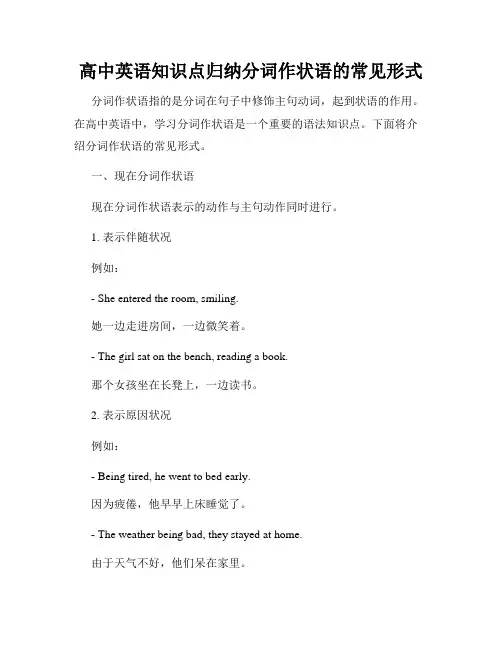
高中英语知识点归纳分词作状语的常见形式分词作状语指的是分词在句子中修饰主句动词,起到状语的作用。
在高中英语中,学习分词作状语是一个重要的语法知识点。
下面将介绍分词作状语的常见形式。
一、现在分词作状语现在分词作状语表示的动作与主句动作同时进行。
1. 表示伴随状况例如:- She entered the room, smiling.她一边走进房间,一边微笑着。
- The girl sat on the bench, reading a book.那个女孩坐在长凳上,一边读书。
2. 表示原因状况例如:- Being tired, he went to bed early.因为疲倦,他早早上床睡觉了。
- The weather being bad, they stayed at home.由于天气不好,他们呆在家里。
3. 表示条件状况例如:- I will go to the park, weather permitting.天气允许的话,我会去公园。
- We went out, the rain having stopped.雨停了,我们出去了。
4. 表示方式、手段状况例如:- He ran to the bus stop, hoping to catch the bus.他跑到公交车站,希望能赶上公交车。
- The boy solved the math problem, using the formula he had learned.这个男孩用他学过的公式解了这个数学问题。
二、过去分词作状语过去分词作状语表示的动作发生在主句动作之前。
1. 表示时间状况例如:- Having finished his homework, he went out to play.他完成了作业后,出去玩了。
- We arrived at the airport, having missed the flight.我们到达机场时,航班已经错过了。

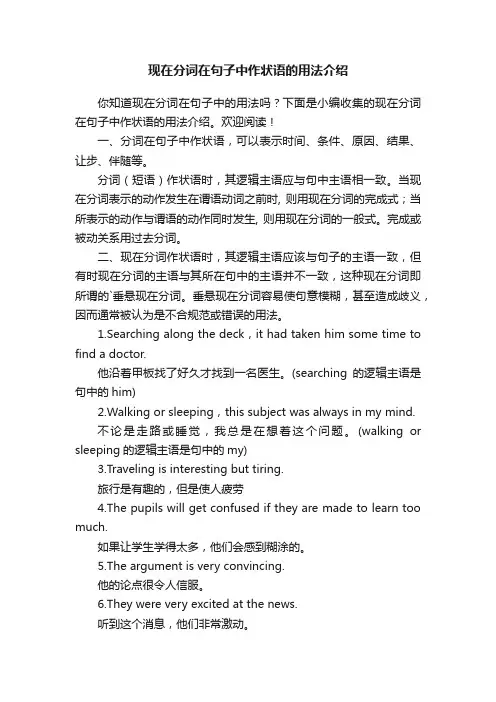
现在分词在句子中作状语的用法介绍你知道现在分词在句子中的用法吗?下面是小编收集的现在分词在句子中作状语的用法介绍。
欢迎阅读!一、分词在句子中作状语,可以表示时间、条件、原因、结果、让步、伴随等。
分词(短语)作状语时,其逻辑主语应与句中主语相一致。
当现在分词表示的动作发生在谓语动词之前时, 则用现在分词的完成式;当所表示的动作与谓语的动作同时发生, 则用现在分词的一般式。
完成或被动关系用过去分词。
二、现在分词作状语时,其逻辑主语应该与句子的主语一致,但有时现在分词的主语与其所在句中的主语并不一致,这种现在分词即所谓的`垂悬现在分词。
垂悬现在分词容易使句意模糊,甚至造成歧义,因而通常被认为是不合规范或错误的用法。
1.Searching along the deck,it had taken him some time to find a doctor.他沿着甲板找了好久才找到一名医生。
(searching的逻辑主语是句中的him)2.Walking or sleeping,this subject was always in my mind.不论是走路或睡觉,我总是在想着这个问题。
(walking or sleeping的逻辑主语是句中的my)3.Traveling is interesting but tiring.旅行是有趣的,但是使人疲劳4.The pupils will get confused if they are made to learn too much.如果让学生学得太多,他们会感到糊涂的。
5.The argument is very convincing.他的论点很令人信服。
6.They were very excited at the news.听到这个消息,他们非常激动。
三、现在分词或过去分词作状语时,有时可以在分词前加while,when, once, although, until, if等连词。
现在分词/过去分词/不定式做状语详讲及分析一.现在分词做状语(表原因,时间,条件,让步,行为方式,伴随状况,现在分词与主句的主语一致,且形成主谓关系,就是说现在分词的动作发出者是主句的主语.例如:①Hearing the got excited. (When they heard the news, they got excited.)现在分词逻辑主语.从这个例句中看出,现在分词的发出者是主句的主语they,且主句的主语与现在分词形成主谓关系② She got home, feeling very tired.逻辑主语现在分词主句的主语与feeling 形成主谓关系③Crossing the road, I saw a girl crying. (When I was crossing the road, I saw a girl crying.)注:当句主句的主语与从句的动词表示动作正在进行.除了省略其连接词be 动词.When he was climbing the step, he heard terrible voice.Because he is a child, he can’t enter into the interbar.’t enter into the interbarbe 动词的现在分词形式.即Being excited, he speaks incoherently.(Because he is excited, he speaks incoherently.)ll go camping. ’ll go camping.)从上面中可以看出,主句中的主语与从句中的主语不一致。
从句中的主语与现在分词形成主谓关系。
因此,现在分词前不能省略其主语⑦He sat in the chair, his glaring eyes looking at her.⑧I feel very excited, because this is my fist time to won the first..①(knowing为一般式)②从上句的句意中得知,买票的动作发生在进电影院之前。
现在分词作状语英语
现在分词作状语表示伴随是最常见的情况。
They came in, followed by their wives. 他们走了进来,后面跟着他们的妻子。
现在分词作状语表示让步。
Defeated, he still believes himself strongly. 虽然被击败了, 但他仍然坚定地相信自我。
现在分词作状语表示条件。
Seen in this light, the mountain looks taller. 从这个角度看,大山显得更高了。
现在分词作状语表示原因。
Shocked by his exercise, I didn’t know what I could say. 被他的经历所震撼,我不知道该说些什么。
现在分词作状语表示时间。
Asked why he came late, he said that got up late.
当他被问到为什么来晚了时,他说他起床起晚了。
现在分词作状语表示方式。
He supports his family driving a taxi. 他靠开出租供养家庭。
现在分词作状语表示结果。
The mother died of disease leaving two young children. 这位母亲死于疾病,留下了两个年幼的孩子。
现在分词作状语用现在分词作状语,其实多数情况下是现在分词和它的连带成分一起作状语,即现在分词短语作状语,相当于其相应的状语从句。
多数情况下置于句首,也可置于句末。
例:1.作时间状语Entering the classroom, the students began to read English.一进教室,学生们就开始读英语。
(相当于As soon as/After they entered the classroom)2.作原因状语The girl doesn't feel like eating any food, being ill for a few days.女孩不想吃任何食物,她病了好几天了。
(相当于Because she has been ill for a few days或Because of her being ill for a few days)3.作条件状语Working hard, he will succeed in passing the English examination.努力学习的话,他就可以通过英语考试。
(相当于从句If he works hard)4.作让步状语Being tired after work, he still insists on studying French.下班后很累,他任然坚持学习法语。
(相当于Though he is tired after work或Though tired after work)5.作结果状语People all over the world sing the song, making it popular.全世界的人都唱这首歌,使它流行了起来。
(相当于so that they make it popular)6.作方式状语Travelling by car , we enjoyed many beautifull places.乘车旅行,我们欣赏了很多优美地方。
现在分词作状语(表示动作发生的时间、原因、结果、条件、让步、方式或伴随情况,通常相当于一个状语从句或并列分句。
一般说来,这种结构的逻辑主语就是句子的主语。
)1. All night long he lay awake, thinking of the problem.2. The six blind men stood there begging for a meal.3. Her husband died ten years ago, leaving her with three children to look after.4. He sat in the armchair, reading a newspaper.5. Having eaten his dinner, the boy rushed out.6. Not knowing her address, I can't write to her.7. Taking the path that leads out of the town, you will come to a lake.8. Hearing their teacher's voice, the pupils stopped talking at once.9. Their car was caught in a traffic jam, thus causing the delay.10. Having lived with the girl for 5 years, we all know her very well.11. The children ran out of the room, laughing and talking merrily.12. Turning to the left, you will find the path leading to the park.13. Working hard, you'll succeed.14. Having received his letter, I decided to write back.15. Having e aten too much, he couldn’t go to sleep16. Working so hard, he failed again.17. They stood there for half an hour watching the stars in the sky.18. She threw the toy on the ground, breaking it into pieces.19. The song is sung all over the country, making it the most popular song.20. They eat using the fingers of their right hands.1)伴随伴随结果伴随时间6)原因条件时间结果原因11)方式条件条件时间原因16)让步伴随结果结果方式至于XXX,doingXXX等不等于XXX,when I XXX?如果是作时间状语就可以。
现在分词作状语的用法如今分词作状语:①如今分词doing所代表的动作或状态与谓语动词是同时或几乎是同时发生的,可以作时间、缘由、方式、条件、结果、目的、让步、伴随等状语。
分词的规律主语就是句子的主语。
如:Rushing out of the house, he was knocked down by a car.他一冲出屋子就被一辆车撞倒了。
My cousin went to Shenzhen, hoping to find a job there.我表兄去深圳了,盼望在那儿找份工作。
The child fell,striking his head against the door.小孩摔了一跤,头在门上碰了一下。
In the last few years, the country has had a hard time, suffering several killer quakes. 过去几年里,这个国家经受了困难的时期,遭受了几次致命的地震。
Being spring, the flowers are in full bloom.因为是春天,所以花都盛开着。
②有些分词作状语,没有规律上的主语,已成为习惯用法:considering, judging from, talking of, allowing for(考虑到), generally/frankly/honestly/roughly/strictly speaking,assuming that(假设)等。
如:Talking of this film, its wonderful.说到这部电影,好极了。
Assuming that it is true, what should we do now假定那是真的, 我们如今该怎麽办Judging by the direction of the wind, it wont rain today.依据风向测度, 今日不会下雨。
谓语动词:有提示词,句子缺谓语(与主语构成主谓结构)1.1 ______ (tell) by my classmates about that.2. My mother ofte n ________ (stop) me from watch ing TV.时态语态变化,及主谓一致非谓语动词(主动---doi ng, 被动---do ne, 目的/结果/将要to do ,)1. We must also con sider the react ion of the pers on ___ (receive) the gift.2. My pupils, Tom ________ (in clude), liked her.1. He en tered, _____ (hold) a book in his hand.2. He en tered the room and ____ (hold) a book in his hand.3. I politely refused her in vitatio n and (walk) away.4. I politely refused her in vitatio n, (walk) away.两个动词是同时发生的时候主语+谓语1 + and / but + 谓语2主语+谓语,+非谓语1. When he ________ (come) in, I was readi ng a book.2. Uni ess I ______ (in vite), I won 'atte nd he party.3. When _____ (hear) the n ews, I was excited.4. Uni ess __ (in vite), I won 'atte nd he party.---When/ if / unless / /After/Before 等连词后没有主语 + 非谓语(---ing /---ed ), 主句---Whe n / if / un less / /After /Before 等连词 + 主语 + 谓语,主句1. A boy _______ ( call ) Jack came here today2. A boy who ________ ( call ) Jack came here today3. We enjoy the movie ________ (direct) by a world famous artist.4. We enjoy the movie which ________ (direct) by the world famous artist.名词后没关系词时+非谓语,非谓语动词修饰前面的名词做定语名词后有关系词时+谓语,做定语从句中的谓语1. You can 'catch me! ” Janet shouted, _______ (run) away.2. He said tha nks and __ (smile) a row of teeth.3. When first ___________ (in troduce) to the market, these products enjoyed greatsuccess.4. When he _______ ( arrive ) at the corner , he met his friend.5. ________ ( sleep ) late, he turned off the alarm clock.6. Don 'tuse words, expressi ons, or phrases ___ (know) only to people withspecific kno wledge.[例 1] I got on the bus and found a seat near the back, and then I noticed a man18 _ (sit) at the fro nt. ( 2011 广东卷)[例 2] He spit it out, __37 (say) it was awful. ( 2010 广东卷)[例 3]The fact that so many people still smoke in public places ____________ t hat we mayn eed a n ati on wide campaig n to raise aware ness of the risks of smok ing.A. suggestB. suggestsC. suggestedD.suggest ingturn1. If you ___ to the left, you'll find the post office.2. ____ to the left, and you'll find the post office.3. to the left , you'll find the post office .[例 4] She wished that he wasas easy 32 _____ (please)as her mother ,who was alwaysdelighted with perfume . (2009 广东卷)see(1)_______ from the top of the hill, our house looks like a car.(2)_______ the dog come over, our friend ran away.(3) _______ from the top of a hill, and you ' II find the city more beautiful.(4) _______ more clearly, they came up and got close to it.1. When _____________ different cultures, we often pay attention only to the differences without noticing the similarities.2. _________ with other top stude nts, you are better.discuss(1) ___________________________ The question now at the meeting is very important.(2) ___________________ The question at the meeting last week is very important.(3) _____________________________ The questi on at the meeti ng n ext week is very importa nt.1. ____ many times, but he still could n't understand it.2. ____ many times, he still could n't un dersta nd it.A. Havi ng bee n toldB. ToldC. He was toldD. To be told1. He is the best one ____ (do) the job.2. He was con sidered the first man ______________ (invent) the teleph one.动词不定式的动作先于谓语动词的动作而发生用to have done1. ___ in thought, he almost ran into the car in front of him. (lose)2. ___ of_play ing football, he went back to the classroom. (tire)3. ___ with_difficulty, he rushed forward bravely. (face)有些过去分词源于系表结果,分词已经形容词化,相当于形容词be lost in; be interested in; be tired of; be satisfied with ; be excited about;be faced with; be dressed in ; be seated1. He hurried to the booking office , only ______________ (tell) that all the ticketshad bee n sold out.to do表示结果一表示出人预料的情况或结果,常用only强调。
2. Europea n football is played in 80 coun tries, _____ (make) it the mostpopular sport in the world.分词表示结果包含着一种必然发生的结果。
His father died last year, (leave)_him_a _l arge fortune.1. The flowers sweet in the garde n attract the visitors to the beauty of n ature.A. to smellB. smelli ngC. smeltD. to be smelt"闻起来很香”用来作定语修饰主语flowers 。
感官动词没有被动。
v-ing 作状语的分类☆一般来说,v-ing 形式表示主动、进行;过去分词表示被动、完成。
☆ -ing 形式作状语,可以表示时间、原因、结果、条件、让步、行为方式、伴随状况等。
▲ doing sth. 作时间状语:* _____ (see) my parents waving in the crowd , I went running to them. * _____ (cross) the road, the old man was knocked over by a car.=Whe n he _____ (cross)_the road, the old man was kno cked over by a car.* When _______ (hear)_the news, he got frightened.=When he (hear) the n ews, he got frighte ned.* Having eaten his dinner, the boy (rush)_out. __* _____ (hear)_their teacher's voice, the pupils stopped talking at once.* ________ (not _______ receive) his letter, I decided to write another letter. ▲ doing sth. 作原因状语:,you should help your students in every way. 'afford a TV set. ) her address, I can't write to her._______ (live) with the girl for 5 years, we all know her very well. (eat) too much, he couldn _ 'tgo to sleep.▲ doing sth. 作结果状语:* There is mud and water everywhere, (make)_it_difficult to travel fromplace to place.现在分词作结果状语表示一种必然性(自然结果)。